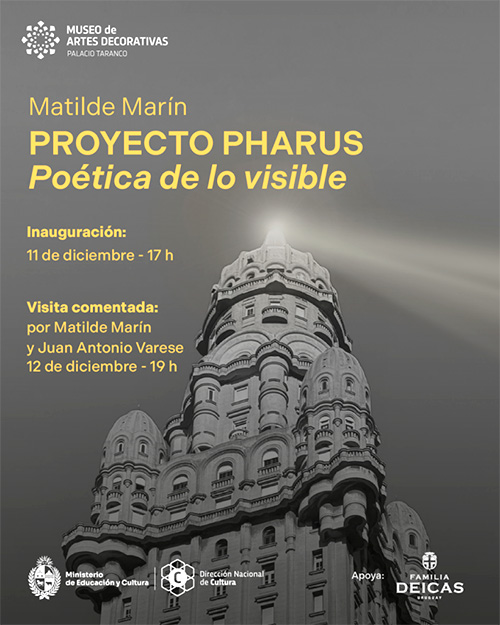Dialogue with Matilde Marín
by Teresa Macri
Buenos Aires, 2002
Teresa Macri: How do new digital technology -photography, video-installations- influence your latest work?
Matilde Marín: I believe that new technology is like a circle or a labyrinth, if one doesn’t go through them it’s impossible to tell if they are any good. For those of us who have been formed dealing with tangible materials, the path towards the estrangement from the actual pieces at the time of their creation constitutes a conceptual change. This is the challenge -because reflection begins conceptually- and the great change of the last years.
I understand new technology’s arrival and close relationship with contemporary art in two ways. While it makes the artist’s formal work easier, on the other hand -and this is its most important aspect- it offers the “possibility” to reflect about images from another place; this prospect and its probable influence in my work is what attracts me most. New technology proposes distinct manners of representation and if one is “aware” they become an introduction to a new understanding of the meaning of art.
TM: Osvaldo Soriano used to write that “Memory makes each thing grow.” In which layer is your subjective memory?
MM: There are many memories: cultural, historic, political-cultural, there is even computer memory. What interests me most is my subjective memory, it’s the one that grows and appears in my work as a theme in what I call “the inner memory of man”. It’s an active memory and the starting point of my series “Desde el muro”, “Fragmento del gesto inicial” and “Juego de manos”.
TM: How do you associate memory with the present and turn it into a narrative of the real?
MM: I’m interested in memory’s ability to work and transform itself at a crossroad between the personal and historic and cultural level; a memory that’s not only remembrance so it can become a real gesture. One doesn’t make art only by remembering.
TM: Okwui Enwezor, director of the latest Documenta, maintains that the “present of the existent is developed as a need for representation in a symbolic and sociologic level.” Do you think that this is an essential imaginary projection for contemporary art?
MM: This question is part of today’s debate. Contemporary art has become a necessary window for the production of the projection Enwezor is talking about. If the existing transcends representation, art has to recover the ability to interrogate and transmit. Many of today’s artists reflect in their work the social and cultural transformations of their surroundings; reality moves to the symbolic to be transmitted in other ways. It’s the image of the artist as witness. As an artist one can chose to make pieces without a context or pieces which reflect a commitment with the present. I prefer the latter.
TM: Globalization is an ambiguous process in itself: it gives visibility to none western cultures but, in the other hand, it standardizes them. What do you think of this risk?
MM: I’ve been traveling through Latin America for a long time and have seen in its cities the replacement of local crafts and the slow erasing of many cultural marks. Globalization makes us live in a yet unknown way in the history of mankind. We are unprotected before an encompassed phenomenon that sees the fast narrative of the information and the cities’ depersonalization through global advertisement images. It’s a harmfully seducing event, though it is impossible to know which values will remain at the end.
TM: How is the troubling political and economic situation reflected in today’s artistic work in Argentina? Has this originated a debate in your work?
MM: The country’s current political and economic conflict has given place to a marginal movement that can be named as “art in the streets”. This is something that’s growing, that’s on its way. As an artist I feel the need to deepen my thought and leave some sort of personal testimony of the country’s unusual moment. Some years ago I showed prints stemming from Shakespeare’s sentence “Work the peace of the present”. I went back to this thought and made a video, filming in the street and working with people’s gaze as witnesses of this wish and of this moment.
TM: Making a synthesis of the present situation, the philosopher Giorgio Agamben maintained that now is the “time of the community”, granting it the people’s representation. The artist has to head his search towards this direction?
MM: At the beginning of this century I thought that it should be solidarity’s moment and that this was going to provide us with a good life. Maybe the community will be the starting place where to build the texture of a new sensibility.
Translated by Victoria Verlichak.

